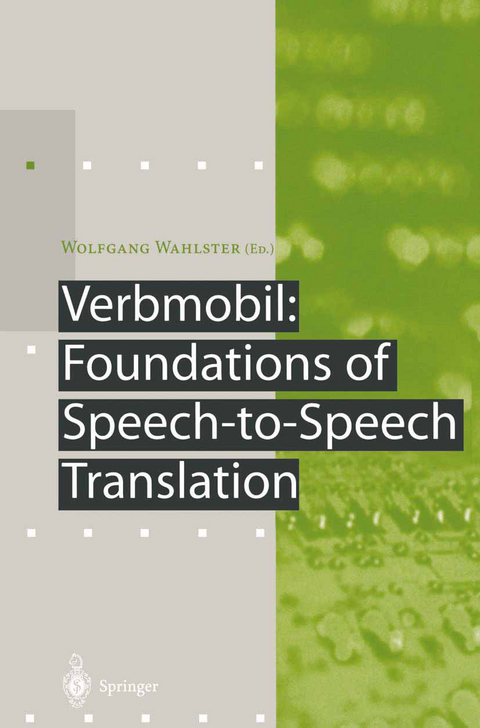
Verbmobil: Foundations of Speech-to-Speech Translation
Springer Berlin (Verlag)
978-3-540-67783-3 (ISBN)
Prof. Dr. Dr. h.c. mult. Wolfgang Wahlster is the Director and CEO of the German Research Center for Artificial Intelligence (DFKI GmbH) and a Professor of Computer Science at the Universität des Saarlandes, Saarbrücken.
Mobile Speech-to-Speech Translation of Spontaneous Dialogs: An Overview of the Final Verbmobil System.- Facts and Figures about the Verbmobil Project.- Multilingual Speech Recognition.- Robust Recognition of Spontaneous Speech.- Fast Search for Large Vocabulary Speech Recognition.- Capturing Long Range Correlations Using Log-Linear Language Models.- Data Driven Generation of Pronunciation Dictionaries.- The Prosody Module.- The Recognition of Emotion.- Processing Self-Corrections in a Speech-to-Speech System.- Integrated Shallow Linguistic Processing.- Probabilistic LR-Parsing with Symbolic Postprocessing.- Robust Chunk Parsing for Spontaneous Speech.- Verbmobil Interface Terms (VITs).- Semantic Construction.- Deep Linguistic Analysis with HPSG.- HPSG Analysis of German.- HPSG Analysis of English.- HPSG Analysis of Japanese.- Efficient and Robust Parsing of Word Hypotheses Graphs.- Speech Lexica and Consistent Multilingual Vocabularies.- Combining Analyses from Various Parsers.- Robust Semantic Processing of Spoken Language.- Discourse and Dialog Semantics for Translation.- Multilingual Semantic Databases.- Semantic-Based Transfer.- Statistical Methods for Machine Translation.- Adapting a Large Scale MT System for Spoken Language.- Example-Based Incremental Synchronous Interpretation.- Example-Based Machine Translation with Templates.- Robust Content Extraction for Translation and Dialog Processing.- Modeling Negotiation Dialogs.- Dialog Processing.- Contextual Disambiguation.- The Verbmobil Generation Component VM-GECO.- The Application of HPSG-to-TAG Compilation Techniques.- Generating Multilingual Dialog Summaries and Minutes.- Speech Synthesis Using Multilevel Selection and Concatenation of Units from Large Speech Corpora.- Verbmobil Data Collection and Annotation.-The Tübingen Treebanks for Spoken German, English, and Japanese.- Multilingual Verbmobil-Dialogs: Experiments, Data Collection and Data Analysis.- Speech Recognition Performance Assessment.- Speech Synthesis Quality Assessment.- From Off-line Evaluation to On-line Selection.- Functional Validation of a Machine Interpretation System: Verbmobil.- Verbmobil From a Software Engineering Point of View: System Design and Software Integration.- From a Stationary Prototype to Telephone Translation Services.- List of Contributors.
| Erscheint lt. Verlag | 31.7.2000 |
|---|---|
| Reihe/Serie | Artificial Intelligence |
| Zusatzinfo | XII, 677 p. |
| Verlagsort | Berlin |
| Sprache | englisch |
| Maße | 156 x 234 mm |
| Gewicht | 1134 g |
| Themenwelt | Geisteswissenschaften ► Philosophie |
| Informatik ► Software Entwicklung ► User Interfaces (HCI) | |
| Informatik ► Theorie / Studium ► Künstliche Intelligenz / Robotik | |
| Schlagworte | Cognition • Dialog Understanding • Dialogverstehen • English • Erkennen gesprochener Spontansprache • German • Language Technology • Machine Translation • Maschinenübersetzung • Modeling • natural language • Natural Language Processing • Semantic Analysis • Speech Recognition • Speech Recognition and Synthesis • Speech-to-Speech Translation • Spracherkennung • Spracherkennung und Sprachsynthese • Sprachtechnologie • Sprachübersetzung • Translation • Übersetzen • Übersetzen gesprochener Sprache • Übersetzen natürlicher Sprache • Übersetzung von Ausgangssprache in Zielsprache • Verbmobil |
| ISBN-10 | 3-540-67783-6 / 3540677836 |
| ISBN-13 | 978-3-540-67783-3 / 9783540677833 |
| Zustand | Neuware |
| Haben Sie eine Frage zum Produkt? |
aus dem Bereich


